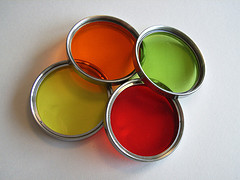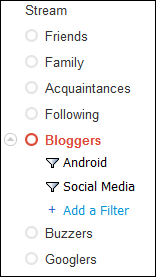Filtering the Social Web.
 Who should filter the social web? Should we as consumers be given the option to display information as we want it or should the network enforce its own filtering technology?
Who should filter the social web? Should we as consumers be given the option to display information as we want it or should the network enforce its own filtering technology?
An interesting discussion has arisen recently around the concepts of filtering the social firehose in order to make the consumption of our streams and feeds less daunting and more relevant.
The Circles functionality within Google+ has really ignited the discussion with power users complaining that, while Circles may allow us to divide individuals into groups, they don't allow us to dive into content based on topic or interest; my previous post talked about the lack of a workable interest graph and how we might look to remedy this.
Concerns
Tom Anderson, co-founder of MySpace, initially voiced concern that Google may wish to use the expertise it has developed in ranking and filtering search results to create algorithms for displaying our Google+ streams in order to improve the signal to noise ratio and potentially "ruin the service". He wonders if Google is even able to let the user take control.
Louis Gray (blogger and VP of Marketing at the filtering service my6sense) expands on this detailing that some feel that content filters based on interests can become self perpetuating: we are presented with content based on our perceived interests and as we then interact with that presented content the filters further refine themselves until we are shown such a focused subset of data that we are missing the bigger picture.
There have been complaints that Facebook has all but ended casual friendships because of its EdgeRank filtering technology. Edgerank looks at each piece of content on the Facebook site and then every interaction with that content to best guess our usage patterns and relationships in order to present us with our "Top news". If we do not interact with someone for a while, or certain types of post, we may not see them after a while and our "casual" relationship may dwindle to nothing through lack of visibility.
Facebook provides us with the option of seeing the 300 most recent news items but the filtered view is the default. The option exists to alter this but, as is usual with Facebook, is tucked away.
Do we need filters?
Twitter has no filters, it is a firehose and we effectively filter the content by choosing who we follow. Lists can break down the number and types of people that we follow in to more manageable chunks but there is no actual content filtering. This is performed by search, hashtags and third party services such as my6sense should you really want to go that route.
There appears to be more of an understanding on Twitter that the flow is just an ongoing stream and you dip your toes in the water whenever you get the chance. You can't hope to read it all so why even try.
Twitter CEO Dick Costolo has confirmed that the company will "stay simple" rather than try to compete on functionality with the likes of Facebook and Google+ and this is part of its charm. If such a policy works for Twitter can it work elsewhere?
Should we also ask if the need to filter our streams is a universal requirement or primarily the curse of the power user? Is a network such as Google+ going to be mainly populated with power users due to its nature or will it appeal to the masses? Looking at the core functionality of the Stream there is no reason why it should not be adopted.
Choice
As I asked above, should it be the consumer or the network that chooses how we display information? Also, as the consumer, should we have the ability of dictate any filter that is applied?
Currently, Google+ displays our stream using an "all or one" approach meaning that we view the contents of all of our circles together or that from our followers in just a single circle. There have been calls for this to be updated to allow us to select multiple circles; this is a good starting point to allow us to manage our stream but we probably need to go further.
Sparking an idea
 Sparks is the one (existing) feature which has come in for the most criticism for not being fleshed out but it could lead by example when looking at how we could implement a method of filtering our streams. Sparks lists our saved searches on the left hand menu for easy reference so could we not apply a similar concept to our stream?
Sparks is the one (existing) feature which has come in for the most criticism for not being fleshed out but it could lead by example when looking at how we could implement a method of filtering our streams. Sparks lists our saved searches on the left hand menu for easy reference so could we not apply a similar concept to our stream?
As we may want to filter for interests within any of our circles perhaps we could create "views" within our stream on a per circle basis. Taking the lead from Sparks these views or filters could be saved for easy reference and applied at will (as in the image to the right) - the default view, however, would still be everything. It would be useful if we could create filters for just about anything: posts mentioning Android, all posts except pictures etc.
Search
I have no doubt that a lot of the issues we face with finding and viewing our content on Google+ will be resolved once Google have implemented the search functionality that was not ready for the launch of the "field trial". We will then have to see how it is envisaged that items will be tagged and subsequently located.
Control
Personally, I agree with Tom that we, the user, should be in control. We should determine any filters in place, what posts are visible and what we have muted (be it post types or people).
Once an API has been released the noise will increase and we will face the prospect of cross-posting from other services rather than the explicit manual posting we currently enjoy so being able to filter our streams in the way we want will be more important than ever.
Image by aslakr

[...] Filtering the Social Web. (ColinWalker.me.uk) [...]
[...] von manch einem Anwender als Bereicherung empfunden werden würde.Wer soll das Web filtern?Auf die Frage, wer das Web filtern soll – wir selbst, oder der Algorithmus – kann man eigentlich nur mit “ja” [...]